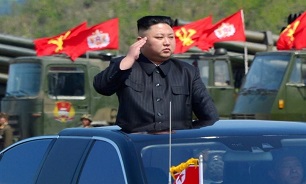North Korea Leader Kim Guides Test of New Anti-Aircraft Weapon
 The North's KCNA news agency did not report the exact nature
of the weapon or the time of the test but said it was organized by the Academy
of National Defense Science, a blacklisted agency that is believed to be
developing missiles and nuclear weapons.
The North's KCNA news agency did not report the exact nature
of the weapon or the time of the test but said it was organized by the Academy
of National Defense Science, a blacklisted agency that is believed to be
developing missiles and nuclear weapons.
The North has been pushing to develop a wide range of weapon systems since early last year at an unprecedented pace including a long-range missile capable of striking the mainland United States and has in recent weeks tested its intermediate-range ballistic missile, making some technical advances, Reuters reported.
The reclusive state rejects UN and unilateral sanctions by other states against its weapons program as an infringement of its right to self-defense and says the program is necessary to counter US aggression.
It last conducted a ballistic missile test a week ago.
The United States denies any intention to attack the North.
"Kim Jong Un ... watched the test of a new type of anti-aircraft guided weapon system organized by the Academy of National Defense Science," KCNA said on Sunday.
"This weapon system, whose operation capability has been thoroughly verified, should be mass-produced to deploy all over the country ... So as to completely spoil the enemy's wild dream to command the air, boasting of air supremacy and weapon almighty," it said.
KCNA said Kim was accompanied by his military aides and listed the three men believed to be the top officials in the country's rapidly accelerating missile program.
They are Ri Pyong Chol, a former top air force general; Kim Jong Sik, a veteran rocket scientist; and Jang Chang Ha, the head of the Academy of National Defense Science, a weapons development and procurement center.
North Korea said on Monday it had successfully tested what it called an intermediate-range ballistic missile that met all technical requirements and could now be mass-produced, although outside officials and experts questioned the extent of its progress.
On Tuesday, the head of the US Defense Intelligence Agency said that if left unchecked, North Korea is on an "inevitable" path to obtaining a nuclear-armed missile capable of striking the United States.
Appearing at a Senate hearing, Defense Intelligence Agency Director Vincent Stewart declined to offer a time estimate but Western experts believe the North still needed several years to develop such a weapon.
